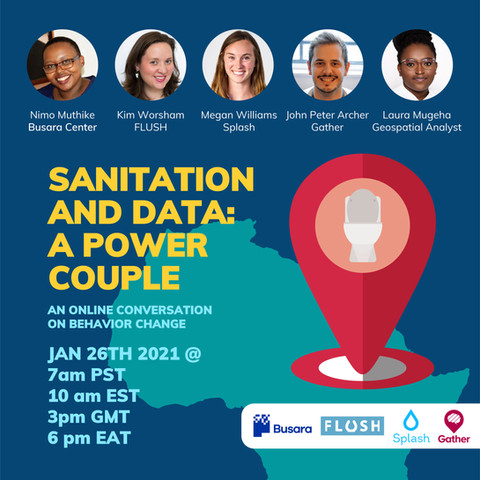Sanitation & Data Webinar
- Kimberly Worsham
- Feb 9, 2021
- 2 min read
Updated: Jan 24, 2024
FLUSH participated in a great panel about the importance of connecting sanitation and data for impactful programs.
The sanitation and hygiene sector have not fully harnessed data yet. Having strong, standardized sector data can unlock the potential for behavior change across systems.
Though programs have collected data, it hasn't increased accountability nor enticed stakeholders to support work.
In late January 2021, we joined an informal conversation with Busara Center for Behavioral Economics, Gather, Laura Mugeha, and Splash on strengthening and standardizing data practices across the hygiene and sanitation sector.
To watch the panel recording, visit Busara's YouTube channel.
On the panel, we discussed why data is vital to creating changes in sanitation programs - from behavior change in communities to course-correcting a program's management. We mentioned the challenges and pains of creating useful data systems - it can be costly and time-consuming!
FLUSH professionals have helped organizations who have no functioning data system...and organizations who collect too much information and don't use it. Both issues can put programs at risk because it becomes difficult (if not impossible) to assess a program's effectiveness. FLUSH talked about working with organizations on creating a clear, lean set of KPIs that help drive programs forward and easily report to funders program impact in different ways.
We also shared how we have used data to move sanitation efforts in remarkable yet different ways - from Gather's efforts to map sanitation access data in Antananarivo (Madagascar), Splash's Tableau dashboards to help assess institutional sanitation management over time, and Busara's efforts to work with communities on creating meaningful data that engages them and shows progress.
At the end, we also shared some practical methods to monitoring data, including:
hacking data collection by using easy to collaborate and dynamic systems, like Airtable,
evaluating organizational data and practices with ODI's Data Ethics Canvas,
using IPA's CART Principles to make sure indicators are worth collecting,
tapping census data (when available) to gain more local context and integrate with insights through GIS information, and
reaching out to other organizations collecting similar data that may be willing to share to avoid collection duplication and increase data efficiencies.
Check out our PDF below that summarizes each panelist's takeaways:





